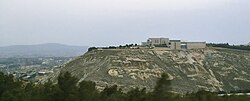Presidential Palace, Damascus
| Presidential Palace | |
|---|---|
 | |
 | |
| Alternative names | New Shaab Palace, Qasr ash-Shaab, People's Palace |
| General information | |
| Architectural style | Structuralistic |
| Town or city | Damascus |
| Country | Syria |
| Construction started | 1985 |
| Completed | 1990 |
| Cost | $1 billion[2] |
| Client | Hafez al-Assad |
| Design and construction | |
| Architect(s) | Kenzo Tange,[1] Wojciech Zabłocki |
| Engineer | Oger Liban |
Presidential Palace (Arabic: قصر الشعب, lit. 'the people's palace') is the residence for the President of Syria, located in Damascus. It is located in the west of the city, on Mount Mezzeh, north of Mezzeh neighborhood, next to Mount Qasioun and overlooks the city. The main building covers 31,500 square metres (340,000 square feet). The entire plateau of Mount Mezzeh is part of the palace premises and is surrounded by a security wall and guard watchtowers. In front of the building is a large fountain and the palace itself largely consists of empty rooms clad in Carrara marble.[3][4]
Although Japanese architect Kenzo Tange is credited with the design, he reputedly resigned from the project before construction of the palace began.[5] The front brass gates were created by the noted Syrian-Jewish metalwork artist Maurice Nseiri.[6]
The palace premises covers about 510,000 square meters (5,500,000 feet) and also includes a private presidential hospital and the headquarters of the Republican Guard. Hafez al-Assad first commissioned the plans for the building in 1979. The building has been labelled as a form of "feudalistic architecture".[7]
The palace is frequently used for hosting government delegations and foreign government visitors.[8][9] On 27 October 1994, Bill Clinton met with Hafez al-Assad at the palace to negotiate a peace plan between Syria and Israel.[10][11][12] Currently, the family of Bashar al-Assad lives in the residence, but they also occasionally reside at the older Tishreen Palace in the Ar Rabwah neighborhood.
References
[edit]- ^ Tange, Kenzo. "New Shaab Palace". Aga Khan Visual Archive, Aga Khan University, Massachusetts Institute of Technology Libraries. Retrieved 29 January 2013.
- ^ Jack Anderson; Dale Van Atta (11 July 1989). "New Syrian palace under wraps". Washington Merry-Go-Round (syndicated column). Daily Record. p. 4. Retrieved 29 January 2013.
- ^ Stephen Talbot (2004). "Syria/Lebanon: The Occupier and the Occupied". PBS. Retrieved 29 January 2013.
- ^ Carol Morello (8 May 1990). "Only Mystery Lives In Syria's Presidential Palace". Philadelphia Media Network. Archived from the original on March 13, 2012. Retrieved 29 January 2013.
- ^ Wainwright, Oliver (11 September 2013). "Assad's palace: an empty, echoing monument to dictator decor". The Guardian. Retrieved 2 October 2015.
- ^ Moubayed, Sami (August 13, 2015). "A Long, Hard Look at 'Zionism in Damascus'". The Huffington Post.
- ^ Kultermann, Udo (1 July 1999). Contemporary Architecture in the Arab States: Renaissance of a Region. McGraw-Hill. ISBN 9780070368316.
a feudalistic architecture [that] makes little or no attempt to be in harmony with the traditional Islamic way of life.
- ^ "House Speaker Pelosi Says Syria Willing to Resume Peace Talks With Israel". Fox News, Associated Press. 3 April 2007. Retrieved 29 January 2013.
- ^ Pelin Turgut (30 April 2011). "How Syria and Libya Got to Be Turkey's Headaches". Time. Archived from the original on May 1, 2011. Retrieved 29 January 2013.
- ^ Wally McNamee (27 October 1994). "Presidents Bill Clinton and Hafez al Assad". Damascus.
- ^ Diana Walker (27 October 1994). "Hafez Al Assad;William J. Clinton". Damascus.
- ^ "Yes, Clinton should visit Assad". The Milwaukee Journal. 26 October 1994. p. A16. Retrieved 29 January 2013.
33°31′3″N 36°15′6″E / 33.51750°N 36.25167°E
